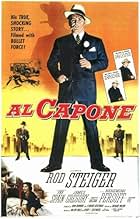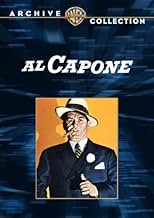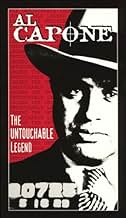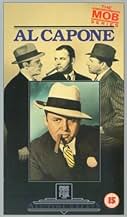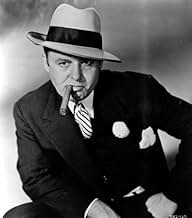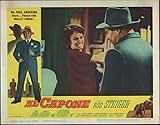AVALIAÇÃO DA IMDb
6,7/10
2,1 mil
SUA AVALIAÇÃO
Adicionar um enredo no seu idiomaA chronicle of the rise and fall of Chicago crime boss Al Capone during the Prohibition era.A chronicle of the rise and fall of Chicago crime boss Al Capone during the Prohibition era.A chronicle of the rise and fall of Chicago crime boss Al Capone during the Prohibition era.
- Direção
- Roteiristas
- Artistas
- Prêmios
- 1 vitória e 1 indicação no total
Raikin Ben-Ari
- Ben Hoffman
- (as Ben Ari)
Fred Aldrich
- Funeral Spectator
- (não creditado)
Cindy Ames
- Nurse
- (não creditado)
- Direção
- Roteiristas
- Elenco e equipe completos
- Produção, bilheteria e muito mais no IMDbPro
Avaliações em destaque
Chicago in the 1920's: rife with political and police corruption and increasingly run by mobsters. The most famous of them undoubtedly was Al Capone. In this bio-pic, Capone is played very effectively by Rod Steiger. Steiger captured both the role and the man. Capone was a guy of humble origins, but was a bit of a contradiction: he had no education but a love for culture; he was a ruthless gangster but for the most part stayed legally "clean." Steiger captured both the ruthlessness and the culture with his portrayal. Based on actual photographs of Capone that I've seen, Steiger even looked the part. He was very impressive.
The movie basically traces Capone's career in crime from the time he arrives in Chicago in 1919 as a bodyguard to a local crime figure and takes it up to his conviction for income tax evasion of all things (it was the only crime they could ever actually pin on him) in 1931, with a very brief look at Capone in Alcatraz, and a voice-over explaining his last years before his death in 1947. Watching his rise was always interesting. A lot of this is fictional. James Gregory's character (the honest Chicago cop who commits himself and his entire career to bringing Capone down, and from whose perspective the story is told) didn't exist, and there's no portrayal of Capone's actual marriage; instead the movie focuses on a relationship he supposedly develops with a woman (Fay Spain) whose husband he had killed in the early part of his criminal career. The character of the newspaperman Keely (Martin Balsam) was based on a real figure, although the name was changed.
By the standards of the modern era of film-making, this is laughably clean. There are a lot of shootouts, but no blood ever appears on those who are shot and killed, and in general these gangsters are awfully polite! There's an extended look on the planning of the St. Valentine's Day Massacre (as Capone used his men to take out many of his rivals in Chicago while he stayed at his home in Florida) although the Massacre itself doesn't take very long and - again - isn't especially graphic.
This represents an interesting and believable (if not quite historically accurate) look at not only Capone but at the state of Chicago in the era and of the role that Prohibition played in promoting the rise of organized crime, and Steiger's performance alone makes this worth watching. (8/10)
The movie basically traces Capone's career in crime from the time he arrives in Chicago in 1919 as a bodyguard to a local crime figure and takes it up to his conviction for income tax evasion of all things (it was the only crime they could ever actually pin on him) in 1931, with a very brief look at Capone in Alcatraz, and a voice-over explaining his last years before his death in 1947. Watching his rise was always interesting. A lot of this is fictional. James Gregory's character (the honest Chicago cop who commits himself and his entire career to bringing Capone down, and from whose perspective the story is told) didn't exist, and there's no portrayal of Capone's actual marriage; instead the movie focuses on a relationship he supposedly develops with a woman (Fay Spain) whose husband he had killed in the early part of his criminal career. The character of the newspaperman Keely (Martin Balsam) was based on a real figure, although the name was changed.
By the standards of the modern era of film-making, this is laughably clean. There are a lot of shootouts, but no blood ever appears on those who are shot and killed, and in general these gangsters are awfully polite! There's an extended look on the planning of the St. Valentine's Day Massacre (as Capone used his men to take out many of his rivals in Chicago while he stayed at his home in Florida) although the Massacre itself doesn't take very long and - again - isn't especially graphic.
This represents an interesting and believable (if not quite historically accurate) look at not only Capone but at the state of Chicago in the era and of the role that Prohibition played in promoting the rise of organized crime, and Steiger's performance alone makes this worth watching. (8/10)
Although Rod Steiger gives an electrifying performance as Al Capone in the film of the same name, it could have been done a whole lot better.
Influenced by the success of The Untouchables on television the classical gangster film underwent a short revival for about five years in the late Fifties and early Sixties. It was inevitable that a film about the most notorious gangster name of all would get a biographical film.
The film concentrated on Capone's public life and the stories of gangland lore that have circulated about him. Very little is shown of his personal life, he had a wife and child and many a mistress not just the character Fay Spain portrays. Rod Steiger has been accused of overacting in his characterization, but in fairness I don't think the writers and director gave him much to work with.
With one exception no characters had name changes. The one being Martin Balsam's character who was based on reporter Jake Lingle whose connections with the underworld got him many a good story, but also compromised his integrity. Capone is shown being responsible for Balsam's death, but in real life there are many theories about Lingle's demise.
One character is grafted in from New York. There was no such a character as James Gregory's honest inspector, mainly because there were damn few honest cops in Chicago in the Twenties. His character is based on Lewis J. Valentine who did run a confidential squad in New York City and faced a lot of political pressure from Tammany Hall. Under Fiorello LaGuardia, Valentine became the city's police commissioner, probably the best one we ever had.
Still if you were a big fan of The Untouchables, you should definitely like this Al Capone movie.
Influenced by the success of The Untouchables on television the classical gangster film underwent a short revival for about five years in the late Fifties and early Sixties. It was inevitable that a film about the most notorious gangster name of all would get a biographical film.
The film concentrated on Capone's public life and the stories of gangland lore that have circulated about him. Very little is shown of his personal life, he had a wife and child and many a mistress not just the character Fay Spain portrays. Rod Steiger has been accused of overacting in his characterization, but in fairness I don't think the writers and director gave him much to work with.
With one exception no characters had name changes. The one being Martin Balsam's character who was based on reporter Jake Lingle whose connections with the underworld got him many a good story, but also compromised his integrity. Capone is shown being responsible for Balsam's death, but in real life there are many theories about Lingle's demise.
One character is grafted in from New York. There was no such a character as James Gregory's honest inspector, mainly because there were damn few honest cops in Chicago in the Twenties. His character is based on Lewis J. Valentine who did run a confidential squad in New York City and faced a lot of political pressure from Tammany Hall. Under Fiorello LaGuardia, Valentine became the city's police commissioner, probably the best one we ever had.
Still if you were a big fan of The Untouchables, you should definitely like this Al Capone movie.
This 1959 picture is yet another cinematic retelling of the life of mobster Al Capone, and is better than most I've seen. Rod Steiger as Big Al seems miscast at first but wins me over in the end. Steiger was a born ham, but a fine actor for all his Methodish mannerisms, and has moments in the movie in which he's almost hypnotically effective. Yes, it's a performance, I kept on telling myself, but so was Capone himself. Over the top, perhaps, but Capone was himself more than a little touched, and Steiger nails this aspect of Capone to perfection, and is more effective in capturing the big guy's capriciousness than Robinson or Muni before him. Steiger's Capone isn't merely a gangster, he's a man possessed.
Director Richard Wilson's keeps this fairly modestly budgeted film moving at a fast pace, and it's never boring. In supporting roles, Fay Spain, Martin Balasm, James Gregory and Nehemiah Persoff are all effective. The black and white of this film evokes the late fifties more than the roaring twenties, and the movie at times feels a little like an episode of The Untouchables, at other times like Some Like It Hot. The Jazz Age was itself hot as the Eisenhower era was drawing to a close. F. Scott Fitzgerald's novels were coming back into vogue. O'Neill revivals on and off-Broadway were becoming commonplace. Al Capone captures this nostalgic mood, but really makes me nostalgic for the fifties more than for the twenties, for a time when fairly recent history could still be viewed as larger than life, the stuff of serious art and contemplation, not just fashionable nostalgia. Al Capone the movie is more nostalgia than serious art, but it touches on important issues, concerning violence, friendship, the role of government and the press as they pertain to and often collude with the criminal element, that still resonate today.
Director Richard Wilson's keeps this fairly modestly budgeted film moving at a fast pace, and it's never boring. In supporting roles, Fay Spain, Martin Balasm, James Gregory and Nehemiah Persoff are all effective. The black and white of this film evokes the late fifties more than the roaring twenties, and the movie at times feels a little like an episode of The Untouchables, at other times like Some Like It Hot. The Jazz Age was itself hot as the Eisenhower era was drawing to a close. F. Scott Fitzgerald's novels were coming back into vogue. O'Neill revivals on and off-Broadway were becoming commonplace. Al Capone captures this nostalgic mood, but really makes me nostalgic for the fifties more than for the twenties, for a time when fairly recent history could still be viewed as larger than life, the stuff of serious art and contemplation, not just fashionable nostalgia. Al Capone the movie is more nostalgia than serious art, but it touches on important issues, concerning violence, friendship, the role of government and the press as they pertain to and often collude with the criminal element, that still resonate today.
It's 1919 Chicago. Al Capone (Rod Steiger) is new in town. Nationwide Prohibition begins in 1920. The violent thug rises to be a top gangster.
This is a brutal depiction of the crime figure. It does have his prominent face scar. I don't always remember it being that prominent although the man is nicknamed Scarface. Overall, the performance has a realistic brutality. It's a rather straight forward biopic. I'm not sure how much new is being done here. Rod Steiger seems to have a dash of Brando but he's not at that level of charisma. The power is present. Others have done it bigger. Nevertheless, it's a very worthy performance.
This is a brutal depiction of the crime figure. It does have his prominent face scar. I don't always remember it being that prominent although the man is nicknamed Scarface. Overall, the performance has a realistic brutality. It's a rather straight forward biopic. I'm not sure how much new is being done here. Rod Steiger seems to have a dash of Brando but he's not at that level of charisma. The power is present. Others have done it bigger. Nevertheless, it's a very worthy performance.
Like so many mid-century biographical films, Al Capone marches through the man's life, giving equal weight to each way-point. It also fails miserably by providing no psychological or historical context for how he became one of crime's most notorious characters. In fact, the film succeeds in white-washing this killer. He woos the widow of one of his victims. He repeatedly makes the point that he's never been convicted of any crime. People die, but there is no depiction of Capone's ruthless, brutal side. Rod Steiger in the title role does an admirable job with the shallow script, but this is not enough to make the film worth watching. Oddly, there's no mention of Elliot Ness and when it comes to summing up Capone's end, we're told he died of "an incurable disease." What, audiences in 1959 couldn't handle the word "syphilis"?
Você sabia?
- CuriosidadesMartin Balsam's character, Mac Keeley, was based on a real-life Chicago Tribune reporter named Jake Lingle. Lingle, a "legman" who ran down gang-related stories for the paper, had close ties to Al Capone and other gangsters as well as the notoriously corrupt Chicago Police Department, and he was well-paid by both mobsters and a police commissioner as a "go-between." Lingle was gunned down on June 9, 1930, much as depicted in the movie, after "getting too big for his hat", as Capone put it, and demanding too much for his services (though a Capone rival likely paid for the hit). Apparently legal concerns prevented the producers of this film from using Lingle's name. However, just a few months after this film was released, the TV series Os Intocáveis (1959) told Lingle's story in its third episode and used his actual name.
- Erros de gravaçãoAl Capones had two scars on his left cheek according to actual (if rare - Capone disliked being photographed to show them as is correctly pointed out in the film) photos. The depiction in films like O Massacre de Chicago (1967) and Capone, o Gângster (1975) is closer to the truth.
- Citações
Al Capone: Nobody leaves Al Capone, you understand that?
Maureen Flannery: Well I do!
Al Capone: Oh no, you don't!
Maureen Flannery: Would you do me a favor please? Would you kill me?
- ConexõesEdited into The Mystery of Al Capone's Vaults (1986)
Principais escolhas
Faça login para avaliar e ver a lista de recomendações personalizadas
- How long is Al Capone?Fornecido pela Alexa
Detalhes
- Data de lançamento
- País de origem
- Idioma
- Também conhecido como
- The Al Capone Story
- Locações de filme
- Empresa de produção
- Consulte mais créditos da empresa na IMDbPro
Bilheteria
- Orçamento
- US$ 550.000 (estimativa)
- Tempo de duração1 hora 44 minutos
- Cor
- Proporção
- 1.85 : 1
Contribua para esta página
Sugerir uma alteração ou adicionar conteúdo ausente



